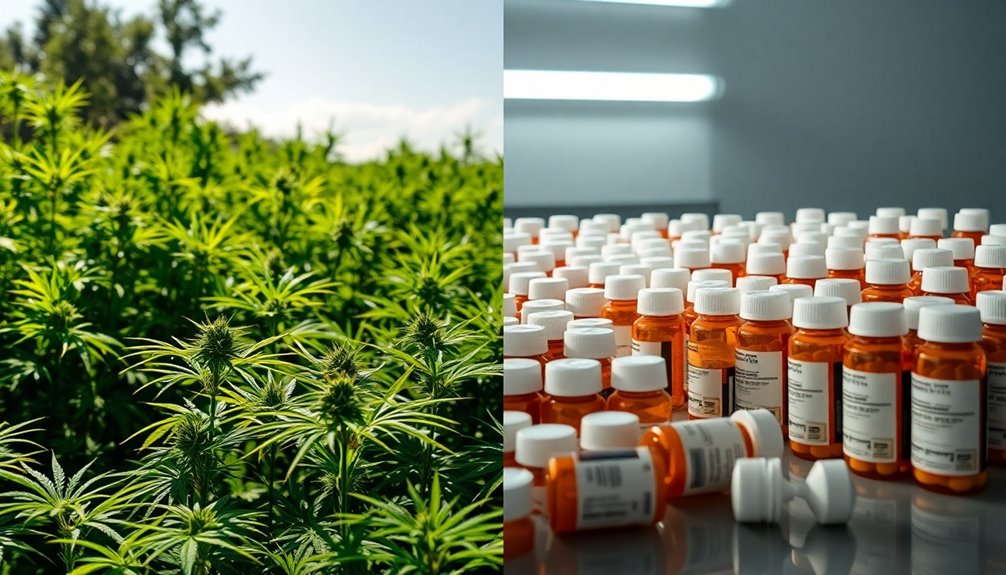When considering CBD versus Zoloft for anxiety, you'll find each has its strengths and weaknesses. Zoloft is a well-established prescription medication, effective for severe anxiety but can come with side effects like nausea and fatigue. On the other hand, CBD offers a natural alternative with fewer side effects and no withdrawal symptoms, though its effectiveness varies. While Zoloft requires a prescription, CBD is available over the counter and often more affordable. Understanding which option suits you best depends on your specific anxiety levels and health needs, and there's much more to explore about both treatments.
Key Takeaways
- Zoloft is a clinically supported SSRI effective for severe anxiety, while CBD may help with milder anxiety or situational relief.
- Common side effects of Zoloft include nausea and sexual dysfunction, whereas CBD has milder effects like dry mouth and drowsiness.
- Zoloft requires a prescription and has long-term costs, while CBD is available over-the-counter and generally more affordable.
- Individual responses to both treatments vary, necessitating consultation with a healthcare provider for personalized management.
- Ongoing monitoring is essential for both Zoloft and CBD users to assess effectiveness and manage potential interactions.
Understanding Zoloft and Its Risks
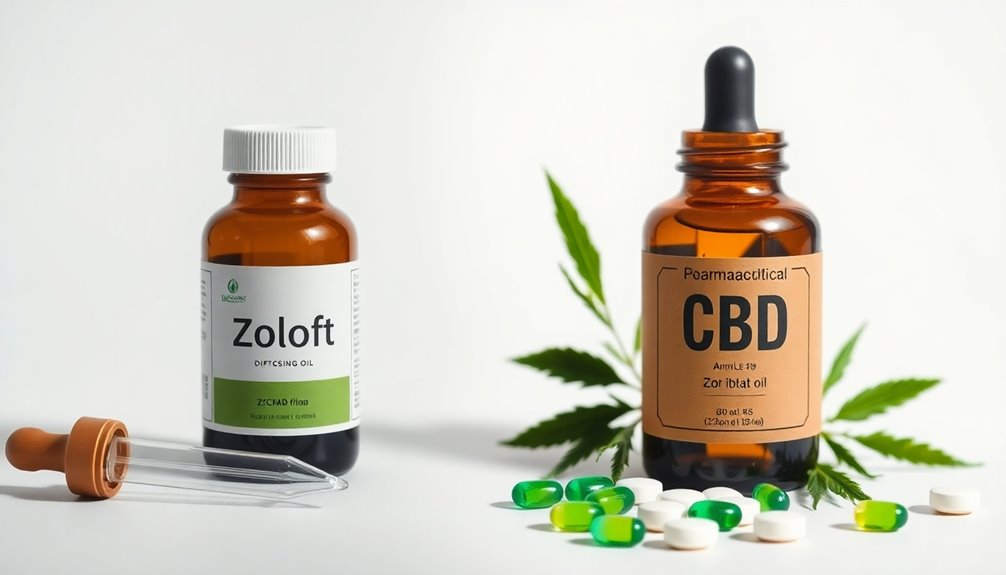
When considering treatment options for anxiety, many people find themselves weighing the benefits and risks of medications like Zoloft. This selective serotonin reuptake inhibitor (SSRI) is commonly prescribed for anxiety disorders, including generalized anxiety disorder and panic disorder.
While Zoloft has therapeutic potential in managing anxiety symptoms, it's vital to understand its risks. You might experience common side effects such as nausea, agitation, fatigue, and sexual dysfunction. Long-term use can also lead to weight gain and dependence, which could complicate your treatment plan.
If you decide to stop taking Zoloft, be mindful that withdrawal symptoms like dizziness, headaches, and irritability can occur. This highlights the importance of tapering off the medication under medical supervision to minimize discomfort.
Additionally, Zoloft carries a risk of serious drug interactions, particularly with MAO inhibitors and other antidepressants, which could lead to serotonin syndrome—a potentially life-threatening condition.
Regular monitoring by your healthcare provider is imperative to assess Zoloft's effectiveness and manage any adverse effects. By being informed about these risks, you can make a more educated decision regarding your anxiety treatment. Furthermore, consulting with your healthcare provider about the potential for withdrawal symptoms can help ensure a safer discontinuation process.
Overview of CBD and Its Benefits
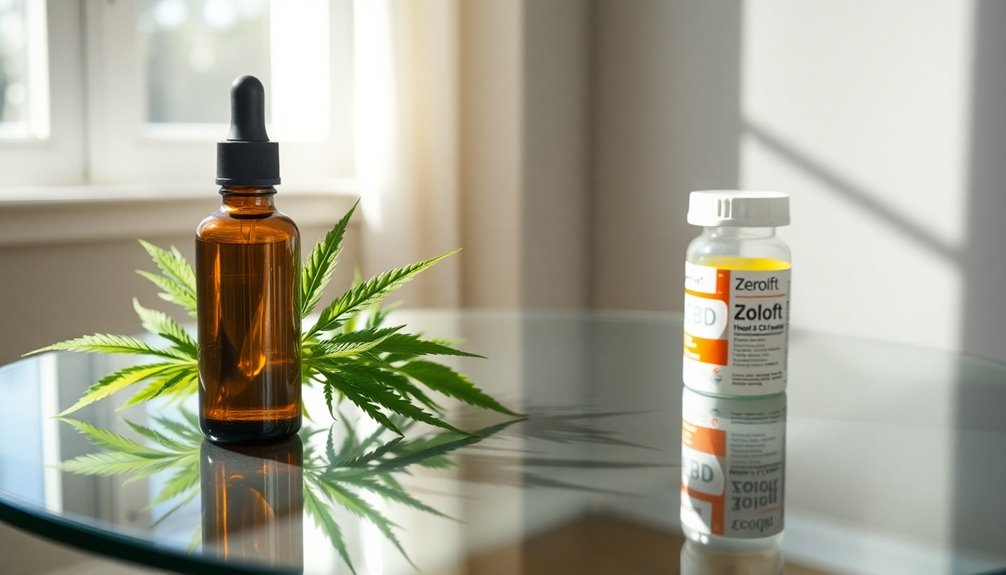
CBD, or cannabidiol, offers a natural alternative for managing anxiety that many people are exploring. Derived from hemp, CBD interacts with your body's endocannabinoid system, helping regulate mood and stress responses. Research suggests that CBD may effectively reduce anxiety symptoms across various disorders, including generalized anxiety disorder, OCD, and PTSD. Some studies even indicate a decrease in anxiety levels during public speaking.
One of the notable benefits of CBD is its relatively mild side effects compared to traditional treatments like Zoloft. While Zoloft can lead to significant side effects such as nausea and sexual dysfunction, CBD is generally associated with minor issues like dry mouth and drowsiness. This makes CBD an appealing option for those looking for a gentler treatment.
Additionally, CBD is available over-the-counter in various forms, such as oils, gummies, and capsules, providing easier access than prescription medications.
However, keep in mind that while CBD shows promise as a natural remedy for anxiety, its long-term efficacy remains under investigation, and it isn't yet FDA-approved for treating anxiety disorders.
Pros and Cons of CBD

When considering CBD for anxiety, you'll notice it generally comes with fewer side effects than Zoloft, which can lead to nausea or sexual dysfunction.
Plus, CBD is often available over-the-counter, making it easier for you to access without a prescription.
However, keep in mind that its effectiveness isn't as well-studied as Zoloft's, so weighing these pros and cons is essential.
Fewer Side Effects
Many people seeking relief from anxiety are turning to CBD due to its reputation for having fewer side effects compared to traditional medications like Zoloft. While common CBD side effects include mild issues like dry mouth and drowsiness, Zoloft can cause nausea, agitation, sexual dysfunction, and fatigue. This stark contrast can make CBD a more appealing option for those worried about adverse reactions.
Moreover, CBD's non-psychoactive nature is a significant advantage, allowing you to maintain cognitive clarity, unlike Zoloft, which may impair your thinking.
Another key point is that CBD doesn't lead to withdrawal symptoms when you stop using it, whereas Zoloft can cause irritability and insomnia.
In the initial weeks of taking Zoloft, side effects can intensify, making the shift challenging. On the other hand, CBD is generally well-tolerated, providing relief with minimal adverse effects.
However, it's worth noting that variability in CBD product quality and formulations can complicate consistent dosing. Overall, if you're concerned about side effects, CBD might be a safer choice for managing anxiety compared to traditional antidepressants like Zoloft.
Legal and Accessibility Issues
Steering through the landscape of legal and accessibility issues surrounding CBD can be a formidable task for those seeking anxiety relief. While CBD products are widely available over-the-counter in various forms like oils and gummies, legal restrictions can vary considerably by state or country.
This patchwork of regulations can complicate your ability to access CBD, especially compared to Zoloft, which requires a prescription from a healthcare provider.
One notable advantage of CBD is its potential cost savings. Prices range from $43 to $153, making it a more affordable option than the ongoing costs of prescriptions for Zoloft.
However, the lack of FDA regulation raises safety concerns about the quality and consistency of CBD products, which can impact their effectiveness. Unlike Zoloft, which is regulated and overseen by healthcare professionals, CBD's unregulated status means you must be vigilant about where you purchase it.
Navigating these legal and safety issues is essential when considering CBD as a treatment for anxiety.
Make certain to research local laws and choose reputable brands to guarantee you're making an informed choice for your mental health.
Pros and Cons of Zoloft
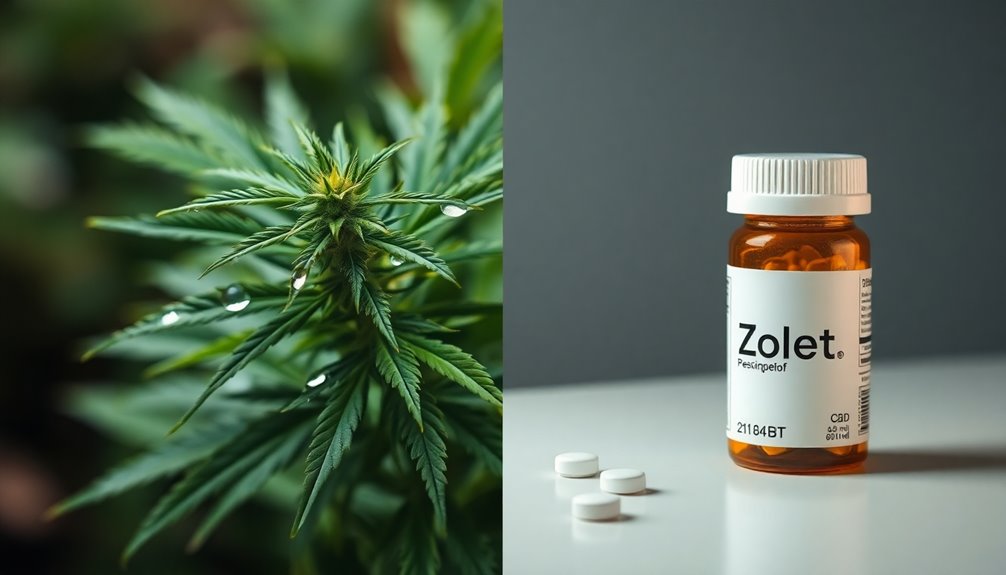
When considering Zoloft for anxiety, it's essential to weigh its common side effects like nausea and fatigue against its long-term risks.
You might also face withdrawal challenges if you stop taking it suddenly, which can include dizziness and irritability.
Understanding these factors can help you make an informed decision about your treatment options.
Common Side Effects
Zoloft, a commonly prescribed antidepressant, can considerably impact your experience with anxiety relief, but it's vital to weigh its side effects. When considering Zoloft for anxiety, especially for generalized anxiety disorder, you might encounter some common side effects. Nausea, agitation, sexual dysfunction, and fatigue can affect your daily functioning and overall quality of life.
During the initial weeks of treatment for generalized anxiety disorder, many users report increased anxiety as their body adjusts to the medication. This adjustment period can be frustrating, leading to second thoughts about the treatment. Understanding that some individuals may experience a higher divorce rate during this time can provide context for the emotional challenges faced. Additionally, it's important to note that natural remedies can complement conventional treatments, offering alternative relief options. Furthermore, discussing your symptoms with healthcare providers can lead to better management strategies during this critical adjustment period. It's also beneficial to explore options such as Roth IRAs for tax-free growth, which can be a part of your overall financial planning as you manage your mental health.
Long-term use may also bring potential downsides, such as weight gain and persistent sexual dysfunction, which could further complicate your mental health journey. Additionally, understanding the potential for financial abuse during this period can be crucial for those who may face economic challenges related to their mental health.
Regular monitoring by healthcare providers is important to manage these side effects effectively. They can help adjust your dosage or suggest alternative strategies to guarantee you receive the best treatment for generalized anxiety.
Ultimately, knowing these common side effects helps you make an informed decision about your anxiety relief options and understand the importance of ongoing communication with your healthcare team.
Withdrawal Challenges
Withdrawal from Zoloft can be a challenging experience for many, as the body readjusts to functioning without the medication. You might encounter withdrawal symptoms like dizziness, fatigue, irritability, and insomnia, especially if you stop suddenly.
Research shows up to 20% of users face these issues, with symptoms appearing within days to weeks and potentially lasting for months.
To minimize these withdrawal effects, gradual tapering under medical supervision is essential. Abruptly stopping can lead not only to discomfort but also a rebound of anxiety symptoms and increased emotional distress.
You must communicate openly with your healthcare provider throughout this process. Some individuals report persistent side effects even after discontinuation, such as sexual dysfunction and mood changes, which highlights the importance of careful monitoring.
Regular follow-ups with your healthcare provider can help you manage withdrawal symptoms effectively and assess the need for alternative treatments. Staying informed and supported during this change can greatly ease your experience, making it essential to have a plan in place before discontinuing Zoloft.
Long-term Risks
Considering long-term use of Zoloft, it's important to weigh both its benefits and potential risks. While Zoloft can effectively manage anxiety, it carries some significant long-term side effects. One common issue is weight gain, which can negatively impact your overall health and well-being.
Additionally, many users report sexual dysfunction, such as decreased libido and difficulty achieving orgasm, which can persist even after you stop taking the medication.
Another important concern is the potential for dependence. Prolonged use of Zoloft may lead to challenges when trying to discontinue the medication, as withdrawal symptoms like anxiety and insomnia can arise. Regular monitoring by healthcare providers is necessary to assess the effectiveness of the medication and manage any adverse side effects that may develop over time.
Moreover, if you're taking Zoloft alongside NSAIDs or blood thinners, you should be aware of the increased risk of bleeding. This factor is particularly important for individuals with bleeding disorders or those planning surgery.
Balancing the long-term risks with the benefits is significant for making informed decisions about your anxiety treatment.
When to Choose Zoloft
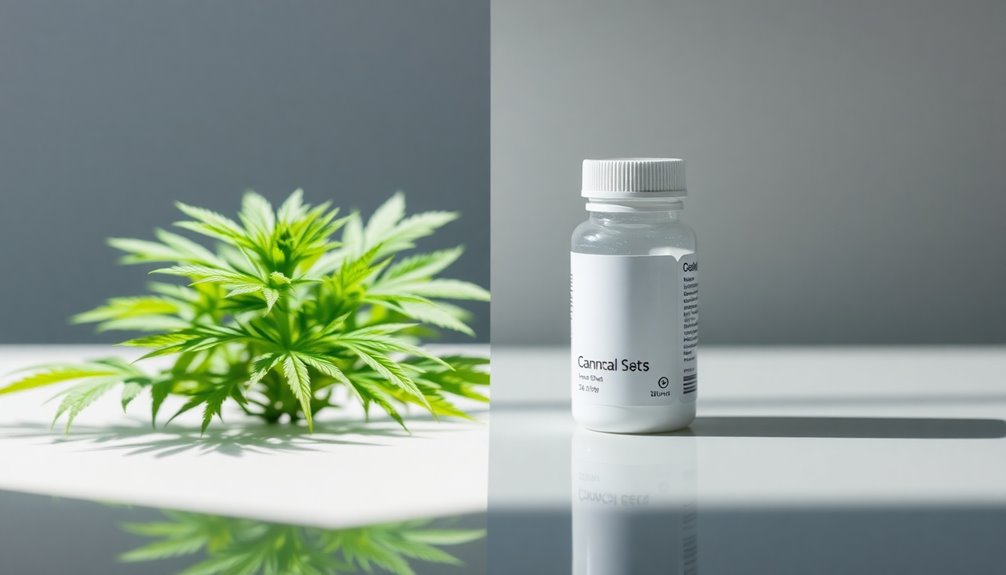
When anxiety looms large and disrupts daily life, choosing Zoloft can be a beneficial step for those with severe conditions. If you're struggling with chronic anxiety or conditions like generalized anxiety disorder, Zoloft may be the right choice for you. Here are some reasons to contemplate it:
- Proven Efficacy: Zoloft has strong clinical support for treating severe anxiety disorders.
- Structured Management: This prescription medication offers a long-term strategy to manage your symptoms effectively.
- Regular Monitoring: You'll benefit from consistent check-ins with your healthcare provider, ensuring any side effects are addressed.
Keep in mind that the therapeutic effects of Zoloft usually take about 4-6 weeks to kick in, so patience is key. If you've had a history of severe anxiety, this gradual approach can be particularly helpful.
However, remember that discontinuing Zoloft should always involve a gradual taper under medical supervision to avoid withdrawal symptoms and potential relapse. This structured support can make a significant difference in your journey towards managing chronic anxiety effectively. Additionally, it's important to consider the importance of support networks during this process, as they can play a crucial role in your emotional recovery.
When to Choose CBD
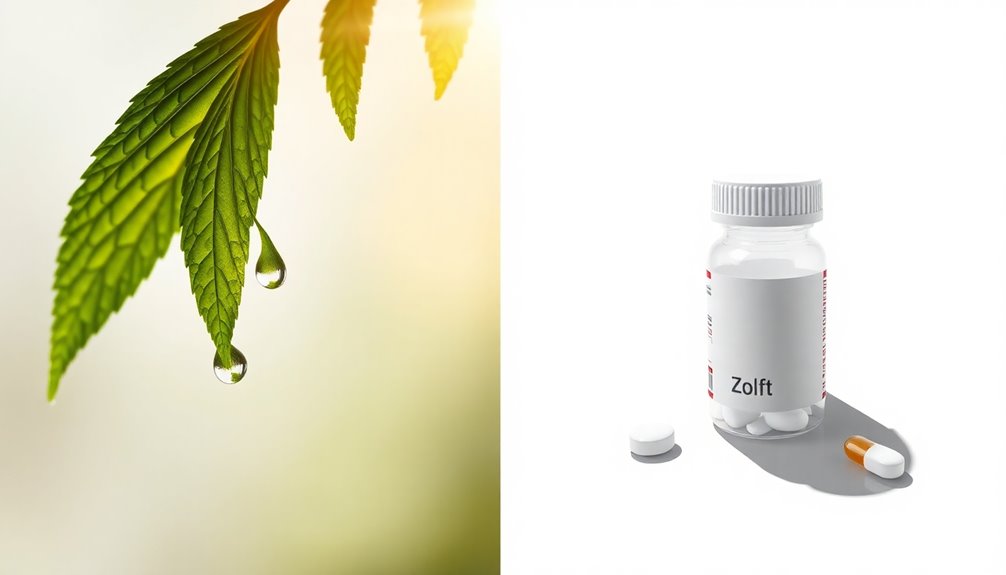
Choosing CBD for anxiety can be a compelling option, especially if you're dealing with mild symptoms or prefer a natural alternative to traditional medications. CBD products are accessible over-the-counter and don't require a prescription, making them an attractive choice for those seeking relief without the severe side effects associated with SSRIs like Zoloft.
If you find that SSRIs aren't effective or you want to avoid them, CBD may serve as a supplementary treatment under medical guidance. It's particularly useful for immediate relief from situational anxiety, such as public speaking, rather than chronic anxiety disorders, where medications like Sertraline are typically more appropriate.
From a medical standpoint, it's crucial to consult with a healthcare provider before starting CBD, especially if you're currently taking medications like Zoloft. This guarantees that you make informed decisions and minimizes the risk of potential interactions.
Ultimately, if you're looking for a gentle, natural approach and your symptoms are manageable, CBD could be the right choice for your anxiety relief.
Co-usage Considerations
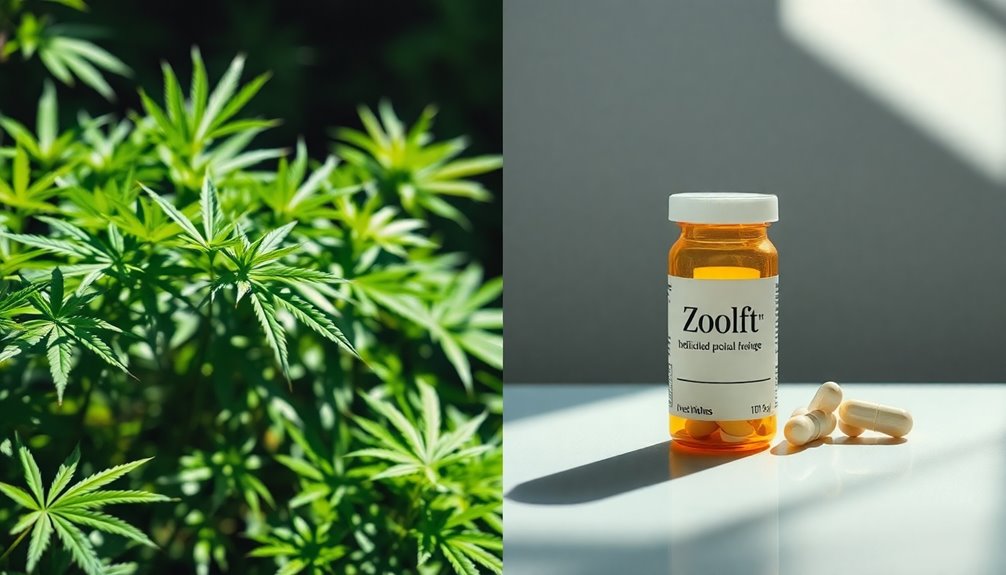
Maneuvering the complexities of co-usage between CBD and Zoloft requires careful attention and awareness. Before you consider combining these substances, it's essential to consult a healthcare provider. Potential interactions might complicate your treatment plan, leading to cognitive impairment and low sodium levels.
Discontinuing Zoloft while introducing CBD without professional guidance can result in significant withdrawal symptoms.
Here are some key co-usage considerations to keep in mind:
- Consult a healthcare provider: Always discuss any changes in your regimen with a professional.
- Careful monitoring: Regular follow-ups are vital to manage effects and assess safety.
- Individual responses vary: What works for one person may not work for another, so stay vigilant.
Self-medicating with CBD while on Zoloft can be risky. Individual responses to CBD can differ widely, and the safety profiles of these combinations aren't fully established.
Until more definitive conclusions are reached, prioritize open communication with your healthcare team to maintain a safe and effective approach to your anxiety management.
Effectiveness and Mechanism of Action
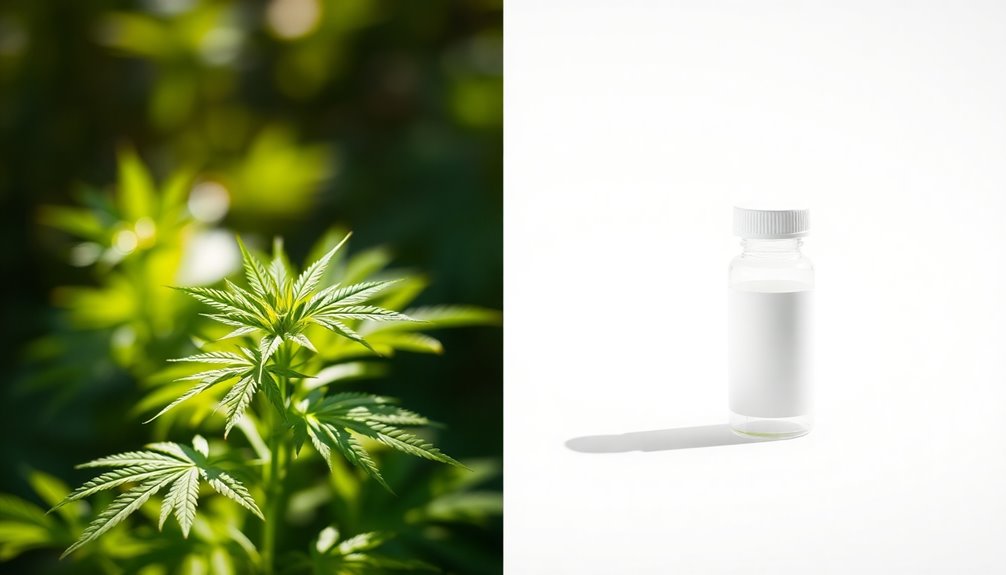
Understanding how both CBD and Zoloft work can help you make informed decisions about your anxiety treatment.
Zoloft, classified as a selective serotonin reuptake inhibitor (SSRI), enhances serotonin availability in your brain. This mechanism of action leads to gradual improvements in emotional stability and anxiety reduction, typically taking about 4-6 weeks for full effects. Extensive clinical support backs Zoloft for treating anxiety disorders, making it a common recommendation for chronic anxiety conditions.
On the other hand, CBD interacts with your body's endocannabinoid system by modulating CB1 and CB2 receptors. This action can help regulate mood and stress, offering quicker relief for situational anxiety. While CBD shows promise in smaller studies, it lacks thorough clinical trials to confirm its effectiveness as a primary treatment for anxiety.
Both Zoloft and CBD target serotonin levels but do so differently. Zoloft directly inhibits serotonin reuptake, while CBD may increase serotonin by preventing its breakdown in your body.
Given these differences, Zoloft is often more suitable for severe anxiety, while CBD might be better for milder cases or as a supplementary treatment.
Cost and Accessibility
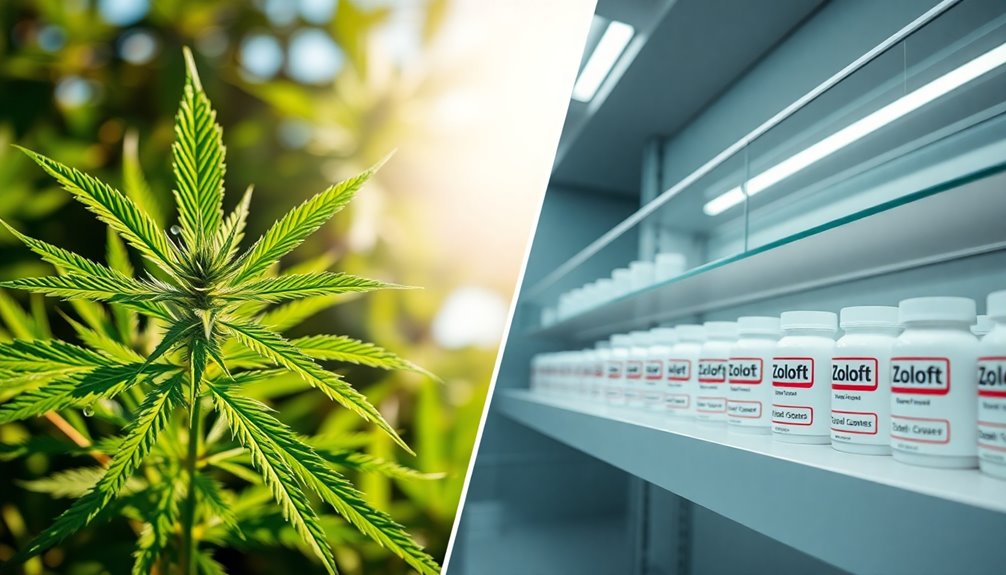
While both CBD and Zoloft can help manage anxiety, their cost and accessibility differ considerably. CBD products are generally more affordable, with prices ranging from $43 to $153, and you can find them over-the-counter.
In contrast, Zoloft requires a prescription, leading to additional healthcare costs, such as doctor visits and insurance copays, which can add up over time.
Here are a few key differences regarding cost and accessibility:
- Prescription Requirement: Zoloft needs a prescription, while you can buy CBD without one.
- Customization: CBD offers various forms like oils, gummies, and capsules, making it easier to find what suits you best compared to Zoloft's limited pill form.
- Legal Status: The legal status of CBD can vary by region, potentially affecting its availability, whereas Zoloft is consistently regulated and available through licensed pharmacies.
Ultimately, if you're looking for a more affordable and accessible option, CBD may be the way to go.
However, always consider consulting a healthcare provider for personalized advice.
Frequently Asked Questions
Can CBD Oil Replace Zoloft?
You might wonder if CBD oil can replace Zoloft for managing anxiety.
While CBD may offer quicker relief for some, it doesn't have the same extensive clinical backing as Zoloft, which is a proven choice for chronic anxiety disorders.
Also, consider that CBD's side effects are milder, but it's not a guaranteed solution for everyone.
Ultimately, it's essential to consult with a healthcare professional before making any changes to your treatment plan.
Is There Something Better Than Zoloft for Anxiety?
When you're looking for something better than Zoloft for anxiety, it really depends on your situation.
Some people find that alternatives like CBD offer quicker relief with fewer side effects, while others may need the robust support of an SSRI like Zoloft for more severe issues.
It's essential to discuss your specific needs with a healthcare provider, as they can help you weigh your options and find the best fit for your anxiety management.
Do Doctors Recommend CBD for Anxiety?
Around 60% of people with anxiety find relief through various treatments, but doctors often recommend sticking to established options like SSRIs first.
While some may highlight CBD's potential benefits, it's not FDA-approved for anxiety, and research remains limited.
Many healthcare providers suggest consulting with them before trying CBD, especially if you're on other medications.
They generally view CBD as a possible adjunct treatment, rather than a primary solution for anxiety.
What Is the Highest Rated Antidepressant for Anxiety?
When you're looking for the highest-rated antidepressant for anxiety, Zoloft (sertraline) often comes up as a top choice.
It's known for effectively increasing serotonin levels in the brain, which helps alleviate anxiety symptoms.
Research shows that Zoloft consistently outperforms placebos, with many patients reporting significant improvements.
Its balance of efficacy and tolerability makes it a popular option among healthcare providers for long-term management of anxiety disorders.
Conclusion
In the tug-of-war between CBD and Zoloft for anxiety relief, both contenders have their strengths and weaknesses. Think of Zoloft as a reliable old friend, offering proven support, while CBD dances lightly on the edges, providing a natural touch. Your choice depends on your unique journey and preferences. Whether you seek the steady assurance of medication or the gentle embrace of nature, remember: the right path is the one that feels like home for you.

